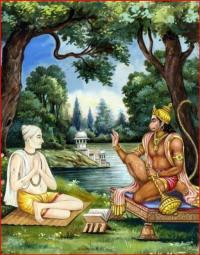
Origins of Hanuman Chalisa
Everyone knows that Goswami Tulsidas ji, the great poet-saint who became known to the masses during the Moghul era in India, not only wrote the Ramcharitmanas in Hindi but also composed the Hanuman Chalisa. The time period in history when Tulsidas ji wrote his devotional works, India was ruled by Akbar. The period was marked by religious strife and moral degradation.
Tulsidas ji wanted to reintroduce the Hindus to the Vedic scriptures. After writing the Ramcharitmanas that connected with the minds and hearts of people of all social classes, particularly in the Northern parts of India, Tulsidas ji started becoming a household name. His own devotion toward Lord Ram intensified, and all of his work was performed in the service of the Lord. People’s faith in God and Tulsidas ji increased to the point where common people started relying on him to help or save them during challenging times. Tulsidas ji dedicated his actions to Lord Ram when he helped others but common people spread rumors that he performed miracles.
When Akbar heard such rumors, he ordered Tulsidas ji to appear in his court and perform some miracles. With all humility, Tulsidas ji told the emperor that he was just a simple devotee of Lord Ram and did not perform any miracles. Akbar was enraged assuming that Tulsidas ji was being non-compliant and defiant toward the emperor. In anger, Akbar ordered him to be imprisoned.
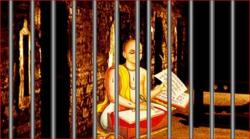
It was when Tulsidas ji was in prison in Fatehpur Sikri, that he composed the Hanuman Chalisa. He was imprisoned for forty days, thus each of the forty verses represents each day in prison. As Tulsidas ji wrote the verses, his heart overflowed with devotional sentiments as he contemplated how Hanuman ji had been instrumental in enabling him to have Lord Ram’s darshan. In a spirit of total surrender to the Lord, Tulsidas ji paid tribute to Hanuman ji’s divine qualities and character strengths in each of the verses. He described how Hanuman ji was the protector and savior of the destitute and devotees who needed divine intervention.
Interestingly, by the time the forty verses were composed, Akbar’s palace and city were inundated by an army of monkeys. They attacked people and destroyed property everywhere. When the situation became unbearable, Akbar pondered on whether this happened because he had imprisoned Tulsidas ji. He went to visit him in the prison and asked him to make the monkeys stop wreaking havoc. Tulsidas ji offered his prayers to Hanuman ji and subsequently, the monkeys disappeared. Akbar released Tulsidas ji from prison.

Significance of Hanuman Chalisa
The story of Saint Tulsidas ji has inspired innumerable people throughout the country even in Kaliyug. People began to perceive the strength and power of chanting Hanuman Chalisa as a way to seek divine grace, especially during challenging times. It is important to understand that mere chanting of these forty verses is not what leads to divine intervention, but the underlying faith and belief in the power of God. When our recitation is accompanied by total humility and surrender to His wishes, the Lord will intervene in a manner that is best for the elevation of souls. Thus, let us chant Hanuman Chalisa, visualizing Hanuman ji going about his seva for Lord Ram, facing and overcoming each obstacle with perseverance.
The beautiful Hanuman Chalisa verses are presented in Hindi along with their English transliteration and the meaning of the verse in English to make these divine verses easily accessible to everyone.
Hanuman Chalisa Verses
दोहा / Couplet
श्रीगुरु चरन सरोज रज, निज मनु मुकुरु सुधारि ।
बरनउँ रघुबर बिमल जसु, जो दायकु फल चारि ॥
Shree Guru charan saroj raj, nij mana mukuru sudhaari.
Barnaun Raghuvar bimal jasu, jo daayaku phal chaari.Meaning: Now that I have polished the mirror of my heart with the dust of my Guru's lotus feet, I recite the divine fame of the greatest king of Raghukul dynasty, which bestows us with the fruit of all the four efforts.
बुद्धिहीन तनु जानिके, सुमिरौं पवन कुमार
बल बुधि विद्या देहु मोहि, हरहु कलेश विकार
Buddhiheen tanu janike, sumiraun pawan-kumar.
Bal buddhi vidya dehu mohi, harahu kalesh vikaar.Meaning: Knowing that this mind of mine is low in intelligence, I remember the Son of the Wind-god who, and beseech him to bless me with strength, wisdom, knowledge, and to remove my suffering and shortcomings that come in the way of devotion.
चौपाई / Quatrain
जय हनुमान ज्ञान गुन सागर, जय कपीस तिहुँ लोक उजागर॥१॥
राम दूत अतुलित बल धामा, अंजनि पुत्र पवनसुत नामा॥२॥
Jai Hanuman gyan gunn sagar, jai kapish tihun lok ujaagar (1).
Meaning: Victory to Lord Hanuman, the ocean of wisdom and virtue. Victory to the Lord who is the supreme among the monkeys and illuminator of the three worlds.
Ramdoot atulit bal dhama, Anjani-putra pawansut naama (2).
Meaning: You are the emissary of Lord Ram, the abode of matchless power, the son of Mother Anjani, and also the son of the Wind-god.
महावीर बिक्रम बजरंगी, कुमति निवार सुमति के संगी॥३॥
कंचन बरन बिराज सुबेसा, कानन कुंडल कुँचित केसा॥४॥
Mahaveer vikram bajrangi, kumati nivaar sumati ke sangi (3).
Meaning: You are the most courageous of all and as mighty as a thunderbolt. You are the destroyer of malevolent intellect, and supporter of those with an altruistic intellect.
Kanchan baran biraj subsea, kaanan kundal kunchit kesa (4).
Meaning: Your skin is golden in color and you are adorned with beautiful clothes. You have adorned yourself with earrings in your ears and your hair is curly and thick.
हाथ बज्र अरु ध्वजा बिराजे, काँधे मूँज जनेऊ साजे॥५॥
शंकर सुवन केसरी नंदन, तेज प्रताप महा जगवंदन॥६॥
Haath vajra au dhwaja biraaje, kaandhe moonj janeu saaje (5).
Meaning: A mace and a flag of righteousness adorn your hands and a sacred thread adorns your shoulder.
Shankar suvan kesarinandan, tej prataap maha jag bandan (6).
Meaning: You are the embodiment of Lord Shiva and vanar-raj Kesari’s son. There is no limit or end to your glory or your magnificence. The whole universe worships you.
विद्यावान गुनी अति चातुर, राम काज करिबे को आतुर॥७॥
प्रभु चरित्र सुनिबे को रसिया, राम लखन सीता मनबसिया॥८॥
Vidyavaan guni ati chaatur, Ram kaaj karibe ko aatur (7).
Meaning: You are the wisest of the wise, most virtuous and very astute. You are always eager to do whatever you can in the service of Lord Ram.
Prabhu charitra sunibe ko Rasiya, Ram Lakhan Sita mana basiya (8).
Meaning: You savor the bliss of listening to Lord Ram's noble character and his actions. Lord Ram, Mother Sita, and Shree Lakshman dwell forever in your heart.
सूक्ष्म रूप धरि सियहि दिखावा, विकट रूप धरि लंक जरावा॥९॥
भीम रूप धरि असुर सँहारे, रामचंद्र के काज सवाँरे॥१०॥
Sukshma roop dhari siyanhi dikhawa, vikat roop dhari Lanka jarawa (9).
Meaning: You assumed a subtle form when you appeared in front of Mother Sita but a huge and formidable form when you burnt Ravan’s kingdom Lanka.
Bheem roop dhari asura sanghare, Ramchandra ke kaaj sanware (10).
Meaning: You slaughtered the demons by taking a massive form like that of Bheem, and successfully completed all the tasks in service of Lord Ram.
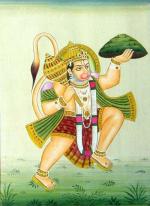
लाय सजीवन लखन जियाए, श्री रघुबीर हरषि उर लाए॥११॥
रघुपति कीन्ही बहुत बड़ाई, तुम मम प्रिय भरत-हि सम भाई॥१२॥
Laaye sanjeevan lakhana jiyaaye, Shree Raghuveer harashi urr laaye (11).
Meaning: Bringing the magic-herb Sanjivani, you revived Shree Lakshman.
Raghupati keenhi bahut badai, tum mum priya, Bhartahi sum bhai (12).
Meaning: Raghupati or Lord Ram praised you immensely and overflowing with gratitude, He said that you are His dear brother in the same way as Bharat.
सहस बदन तुम्हरो जस गावै, अस कहि श्रीपति कंठ लगावै॥१३॥
सनकादिक ब्रह्मादि मुनीसा, नारद सारद सहित अहीसा॥१४॥
Sahas badan tumharo jas gave, asa kahi shreepati kanth lagaave (13).
Meaning: Expressing these words of gratitude, Lord Ram drew you close and embraced you.
Sankaadik brahmadi munisa, Narad sarad sahit aheesa (14).
Meaning: All the saints like Sanak, Sanandan etc., gods like Brahma, Saraswati, sages like Narad, and the king of serpents, sing your glory.
जम कुबेर दिगपाल जहाँ ते, कवि कोविद कहि सके कहाँ ते॥१५॥
तुम उपकार सुग्रीवहि कीन्हा, राम मिलाय राज पद दीन्हा॥१६॥
Jam kuber digpal jahan te, kavi kovid kahi sake kahan te (15).
Meaning: Celestial gods like Yama, Kuber and the guardians of the four quarters, as well as poets and scholars do not have enough words to describe your glory.
Tum upkaar Sugreev hi keenha, Ram milaaye raj-pad deenha (16).
Meaning: You helped Sugreev by introducing him to Lord Ram who reinstituted his crown. Therefore, you gave him the kingship (i.e., the dignity of being called a king).
तुम्हरो मंत्र बिभीषण माना, लंकेश्वर भये सब जग जाना॥१७॥
युग सहस्त्र जोजन पर भानू, लिल्यो ताहि मधुर फ़ल जानू॥१८॥
Tumharo mantra Vibhishan maana, Lankeshwar bhaye sab jag jaana (17).
Meaning: Likewise, complying with your teachings, even Vibhishan became the king of Lanka.
Yug sahastra jojan par Bhanu, leelyo taahi madhur phal jaanu (18).
Meaning: You swallowed the sun that was located thousands of miles away, mistaking it to be a sweet and delicious red fruit!
प्रभु मुद्रिका मेलि मुख माही, जलधि लाँघि गए अचरज नाही॥१९॥
दुर्गम काज जगत के जेते, सुगम अनुग्रह तुम्हरे तेते॥२०॥
Prabhu mudrika meli mukh maahi, jaladhi laandhi gaye achraj naahi (19).
Meaning: Keeping Lord Ram’s ring in your mouth, you crossed over the ocean, but to no one’s astonishment.
Durgam kaaj jagat ke jete, sugam anugrah tumhare tete (20).
Meaning: All difficult tasks of this world become easy, with your grace.
राम दुआरे तुम रखवारे, होत ना आज्ञा बिनु पैसारे॥२१॥
सब सुख लहैं तुम्हारी सरना, तुम रक्षक काहु को डरना॥२२॥
Ram duaare tum rakhvare, hota na aagya binu paisare (21).
Meaning: You are the guardian at the door of Lord Ram. No one can move forward without your permission, which means that only with your blessing can one have the darshan of Lord Ram.
Sab sukh lahe tumhari sarna, tum rakshak kahu ko dar na (22).
Meaning: Those who take refuge in you find all the comfort and happiness. When we have a protector like you, we do not need to be scared of anyone or anything.
आपन तेज सम्हारो आपै, तीनों लोक हाँक तै कापै॥२३॥
भूत पिशाच निकट नहि आवै, महावीर जब नाम सुनावै॥२४॥
Aapan tej samharo aape, teeno lok haank te kaampe (23).
Meaning: You alone can withstand your magnificence. All three worlds start trembling at when they hear your growl.
Bhoot pishaach nikat nahi aavein, Mahaveer jab naam sunaave (24).
Meaning: No ghosts or evil spirits come near the ones who remember your immense courage and chant your name, O Mahaveer! Thus, just remembering your name is enough!
नासै रोग हरे सब पीरा, जपत निरंतर हनुमत वीरा॥२५॥
संकट तै हनुमान छुडावै, मन क्रम वचन ध्यान जो लावै॥२६॥
Naase rog hare sab peera, japat nirantar hanumat veera (25).
Meaning: O Hanuman! All kinds of diseases and pain are eradicated when one chants your name. Therefore, chanting your name regularly is considered to be very auspicious.
Sankat te hanuman chudave, mann kram vachan dhyaan jo laave (26).
Meaning: Whoever meditates upon or worships you with thought, word, and deed, becomes free from all kinds of crisis and affliction.
सब पर राम तपस्वी राजा, तिनके काज सकल तुम साजा॥२७॥
और मनोरथ जो कोई लावै, सोई अमित जीवन फल पावै॥२८॥
Sab par Ram tapasvi raja tin ke kaaj sakal tum saaja.
Meaning: Lord Ram is the greatest ascetic amongst all the kings, however, it was you who carried out all the tasks on behalf of Lord Ram.
Aur manorath jo koi laave, soi amit jivan phal paave.
Meaning: One who comes to you with any longing or a sincere desire, obtains the abundance of the manifested fruit, which remains bestowed throughout life.
चारों जुग परताप तुम्हारा, है परसिद्ध जगत उजियारा॥२९॥
साधु संत के तुम रखवारे, असुर निकंदन राम दुलारे॥३०॥
Chaaron yug partap tumhara, hai parsidh jagat ujiyara.
Meaning: Your splendor fills all the four ages and, your glory is renowned throughout the world.
Saadhu-sant ke tum rakhvare, asur nikandan ram dulaare.
Meaning: You are the guardian of saints and sages, destroyer of demons, and one who is adored by Lord Ram.
अष्ट सिद्धि नौ निधि के दाता, अस वर दीन जानकी माता॥३१॥
राम रसायन तुम्हरे पासा, सदा रहो रघुपति के दासा॥३२॥
Ashta siddhi nau nidhi ke data, as var deen janaki mata.
Meaning: You have been blessed by Mother Janaki to become the bestower of boons to the deserving ones, wherein you can grant the siddhis (i.e., eight different powers) and the nidhis (i.e., nine different kinds of treasures).
Ram rasayan tumhare paasa sada raho Raghupati ke daasa.
Meaning: You have the essence of Ram bhakti, may you always remain the humble and devoted servant of Raghupati.
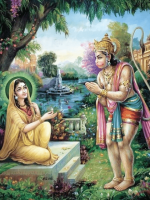
तुम्हरे भजन राम को पावै, जनम जनम के दुख बिसरावै॥३३॥
अंतकाल रघुवरपुर जाई, जहाँ जन्म हरिभक्त कहाई॥३४॥
Tumhare bhajan ram ko paave, janam janam ke dukh bisraave.
Meaning: When one sings your praise and chants your name, he gets to meet Lord Ram and finds relief from the sorrows of endless lifetimes.
Antkaal Raghuvar pur jaayi, jahan janam Hari-bhakt kahayi.
Meaning: By your grace, one will go to the immortal abode of Lord Ram after death and remain devoted to Him.
और देवता चित्त ना धरई, हनुमत सेई सर्व सुख करई॥३५॥
संकट कटै मिटै सब पीरा, जो सुमिरै हनुमत बलबीरा॥३६॥
Aur devta chitta na dharai, Hanumat sei sarva sukh karai.
Meaning: There is no need to serve any other deity or god. Service to Lord Hanuman provides all forms of happiness and bliss.
Sankat kate, mite sab peera, jo sumire Hanumat balbeera.
Meaning: All troubles cease and the pain ends for the one who remembers the powerful Lord Hanuman.
जै जै जै हनुमान गुसाईँ, कृपा करहु गुरु देव की नाई॥३७॥
जो सत बार पाठ कर कोई, छूटहि बंदि महा सुख होई॥३८॥
Jai jai jai Hanuman gosain, kripa karahu Gurudev ki naai.
Meaning: O Lord Hanuman! Praises and glory to you O mighty Lord, please bestow your grace as our supreme Guru.
Jo sat baar paath kar koi, chutahi bandhi maha sukh hoyi.
Meaning: One who recites this chalisa a hundred times, is released from all bondages and will attain great bliss.
जो यह पढ़े हनुमान चालीसा, होय सिद्ध साखी गौरीसा॥३९॥
तुलसीदास सदा हरि चेरा, कीजै नाथ हृदय मह डेरा॥४०॥
Jo yeh padhe Hanuman Chalisa, hoye siddhi saakhi gaurisa.
Meaning: One who reads and recites this Hanuman Chalisa, will be able to accomplish all his work. Lord shiva, himself, is the witness to this prophesy.
Tulsidas sada Hari chera, keeje nath hriday mah dera.
Meaning: Says Shree Tulsidas, “O Lord Hanuman, may I always remain a servant, a devotee to Lord Shree Ram, and may you always reside in my heart.
दोहा / Couplet
पवन तनय संकट हरन, मंगल मूरति रूप।
राम लखन सीता सहित, हृदय बसहु सुर भूप॥
Pawan tanay sankat haran, mangal murti roop.
Meaning: O the son of wind, you are the destroyer of all sorrows. You are the embodiment of fortune and prosperity.
Ram Lakhan Sita sahit, hriday basahu sur bhoop.
Meaning: May you always dwell in my heart along with Lord Ram, Lakshman and Mother Sita.
जैकार / Jaikar
सियावर रामचंद्र की जय! पवनसुत हनुमान की जय! बोलो भई सब संतन की जय!
Siyawar Ramchandra ki Jai! Pawansut Hanuman ki Jai! Bolo bhai, sab Santan ki Jai!
Hanuman Janma Mahotsav at the Radha Krishna Temple of Dallas (Allen)
The awe-inspiring Hanuman Chalisa and the related leelas (i.e., pastimes) teach us about the power of selfless devotion for God. To help us all remember the significance of devotional chanting, the Temple is hosting the Hanuman Janma Mahotsav on April 6, 2023, from 6:00 to 8:30 PM CST.
Weekly Devotional Hanuman Pooja
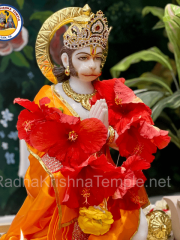
The Radha Krishna Temple of Dallas (Allen) invites devotees and community members to participate in the beautiful and devotional Hanuman Tel-Sindoor Abhishek, chanting of Hanuman Chalisa, Hanuman Aarti, and other kirtans every Tuesday starting at 6:15 PM. Devotees can participate both in-person or virtually. Please join us to partake in the bliss of the most devotional ritual to receive blessings, protection, strength, and energy.


